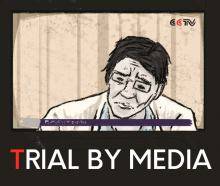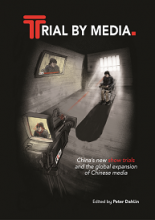China takes forced confessions to new platforms
 Chinese police are moving away from TV broadcasts and using short video platforms, microblogs and targeted screenings to air forced confessions.
Chinese police are moving away from TV broadcasts and using short video platforms, microblogs and targeted screenings to air forced confessions.
China is now famous for making and broadcasting the coerced confessions of detainees (mostly pre-trial and often before seeing a lawyer and even formal arrest) on state TV including on international channels.
From 2013 to 2019, they had aired confession broadcasts with more than a 100 victims, despite this breaking international human rights laws and their own domestic law on the right to a fair trial.
Our research (see Scripted and Staged: Behind the scenes of China’s forced televised confessions) has demonstrated that these are faked and forced, with the words often written by the police and victims made to dress up, learn their “lines” and “act” in front of the cameras.
Many of those forced to confess have been Chinese human rights defenders, but they also include a number of foreign citizens ranging from Swedish, Hongkonger to Taiwanese. The majority of these were aired on China's state TV broadcaster CCTV (with several also carried by their overseas arms, CCTV-4 in Chinese and CGTN in English and other languages).
Recognizing that international audiences were largely unconvinced by the confessions; in fact they have been roundly condemned globally, especially following Safeguard Defenders' campaign which includes the above report and two pending complaints in the UK which could see CGTN loose its licence to broadcast, China appears to be testing new formats and channels for airing the confessions: short video platforms, police Weibo and private screenings.
(For a post on earlier developments in forced public confessions, see here.)
Short video platforms
Last week a Uighur man, Abdulhelil Dawut shot a video strangely reminiscent of these TV forced confessions and posted it on Kuaishou, China’s second-biggest short video platform.
In his “video,” Dawut disputed testimony given by his younger sister Zumuret Dawut. She had described how she had been beaten and forcibly medicated at a Xinjiang concentration camp, and sterilized before being allowed to leave the country (her husband is from Pakistan).
Many Uighurs have testified overseas to the brutality of the camps, so why did this case prompt such a strange video response?
The likely reason was that US Secretary of State Mike Pompeo had singled out her treatment when speaking at the Vatican earlier this month.
Dawut’s video is a classic “denial” confession, where victims are forced in front of the camera to “deny” accusations made by international NGOs, organizations or foreign governments. They are a crude tool of foreign policy.
Examples of "deny confessions" broadcast on CCTV include Swedish publisher Gui Minhai saying he hadn’t been kidnapped in Thailand; Chinese human rights lawyer Wang Yu condemning attempts by sympathisers to help her teenaged son escape from China; and human rights lawyer Xie Yang claiming accounts he had been tortured by police were not true.
There are many odd aspects to Dawut’s video that indicate it was surely made by the state for a foreign audience.
- Dawut posted the video to Kuaishou and added “English” subtitles. Why and how would a Uighur man who doesn't speak English do that? Why are there no Chinese subtitles?
- As Alip Erkin from Uighur Bulletin pointed out, news inside China is heavily censored and this is even more true in Xinjiang. There is virtually no way for Dawut to have heard about Pompeo’s comments. Using a VPN alone would be enough of a reason to get sent to a camp.
- With more than one million Uighurs in concentration camps, and life on the street under intense surveillance, any online activity in Xinjiang is dangerous. Mentioning the camps, even using the state euphemism for them as vocational centres, is also taboo.
- Masha Borak, a Hong Kong-based reporter spotted that this was Dawut’s first and only video on Kuaishou. It looks like he started to use the service just to post that video.
- The video is unlike most short videos posted on Kuaishou, it looks staged, with the camera steady (possibly on a tripod) and he appears to be reading from something.
- China’s state-owned hawkish English-language newspaper Global Times, conveniently ran a story on the short video on its website shortly after it was made. Party newspaper, The People's Daily also ran a story and showed the video on its English language website.
His sister, speaking from overseas, says she is now worried about his safety. She also noted how the video looked staged, said he didn’t know anything about video sharing apps and “wouldn’t dare try to distribute something of this magnitude.”
Police Weibo
In early October a motorway bridge collapsed killing at least three people in Wuxi, Jiangsu province.
Within hours of photos of the rescue operation being posted online, local police had posted curious “confession” videos on their Weibo account.
Two men, surnamed Gu and Li, confessed to posting fake news on their WeChat accounts. The two of them had commented online that the Wuxi police chief, shown in rescue photos, was wearing a luxury watch.
Both men are shown separately, Mr. Gu in front of a barred cell; Mr. Li in front of a blank wall. They are dressed in civilian clothes with their facial features blurred.
Their wooden delivery and posture make it look like they were reading from a script. The wording of their “confessions” is also very similar. Both announce their names, say they had posted fake comments to attract attention, that they know their behaviour was illegal and they are sorry or regretful.
Laurie Chen at The South China Morning Post also reported the confessions without adding any context that they were likely coerced or mentioning China’s history of forced confessions.
The South China Morning Post is famous for colluding with police on a previous forced confession in January 2018 with Gui Minhai.
Private screenings
 Last August, a number of students and activists who had gone to Shenzhen to support factory workers who were demanding the right to form a union, were disappeared by the police.
Last August, a number of students and activists who had gone to Shenzhen to support factory workers who were demanding the right to form a union, were disappeared by the police.
Many student Marxist groups from around the country had then tried to campaign on behalf of the missing students and activists. They called themselves the Jasic Workers Solidarity Group after the name of the factory where the workers were employed.
In December, students at Beijing University who were protesting about the takeover of their Marxist society by a CCP-controlled student association were rounded up by police and shown “confession” videos lasting about half an hour by four of those who had gone missing that August. Other students said they had been forced to watch the same videos by police in separate occasions.
The confessors – Shen Mengyu, Zheng Yongming, Gu Jiayue and Yue Xin (pictured) -- all recent graduates, said they had spread “false information”, worked to overthrow the government and collaborated with foreign media.
These are exactly the same admissions that many human rights defenders were forced to say on camera in TV confessions aired duting 2015 and 2016 during the Party's crackdown against lawyers (also called the 709 Crackdown).
In the case of the Jasic students, it is widely believed that police are using the videos to threaten and force them to stop their activism.
More than one year on, police are still holding 44 students and activists including the four mentioned above.
 To learn more about China's forced TV confessions, the role of CCTV in making them with the police, and how Chinese media is expanding abroad, especially in Europe, read Safeguard Defenders' book: 'Trial By Media', available on Amazon worldwide as a paperback and kindle ebook.
To learn more about China's forced TV confessions, the role of CCTV in making them with the police, and how Chinese media is expanding abroad, especially in Europe, read Safeguard Defenders' book: 'Trial By Media', available on Amazon worldwide as a paperback and kindle ebook.